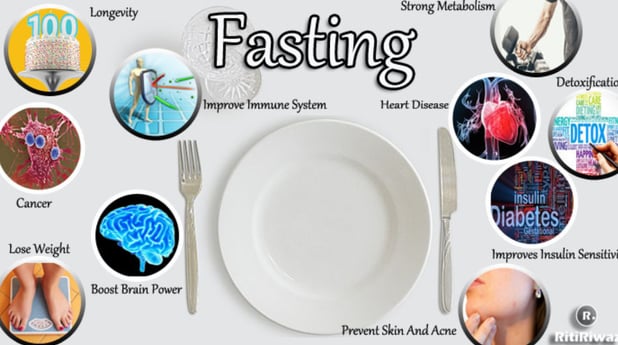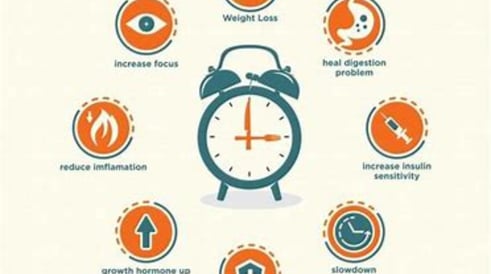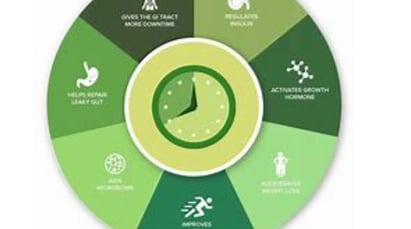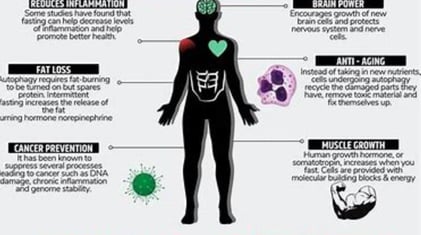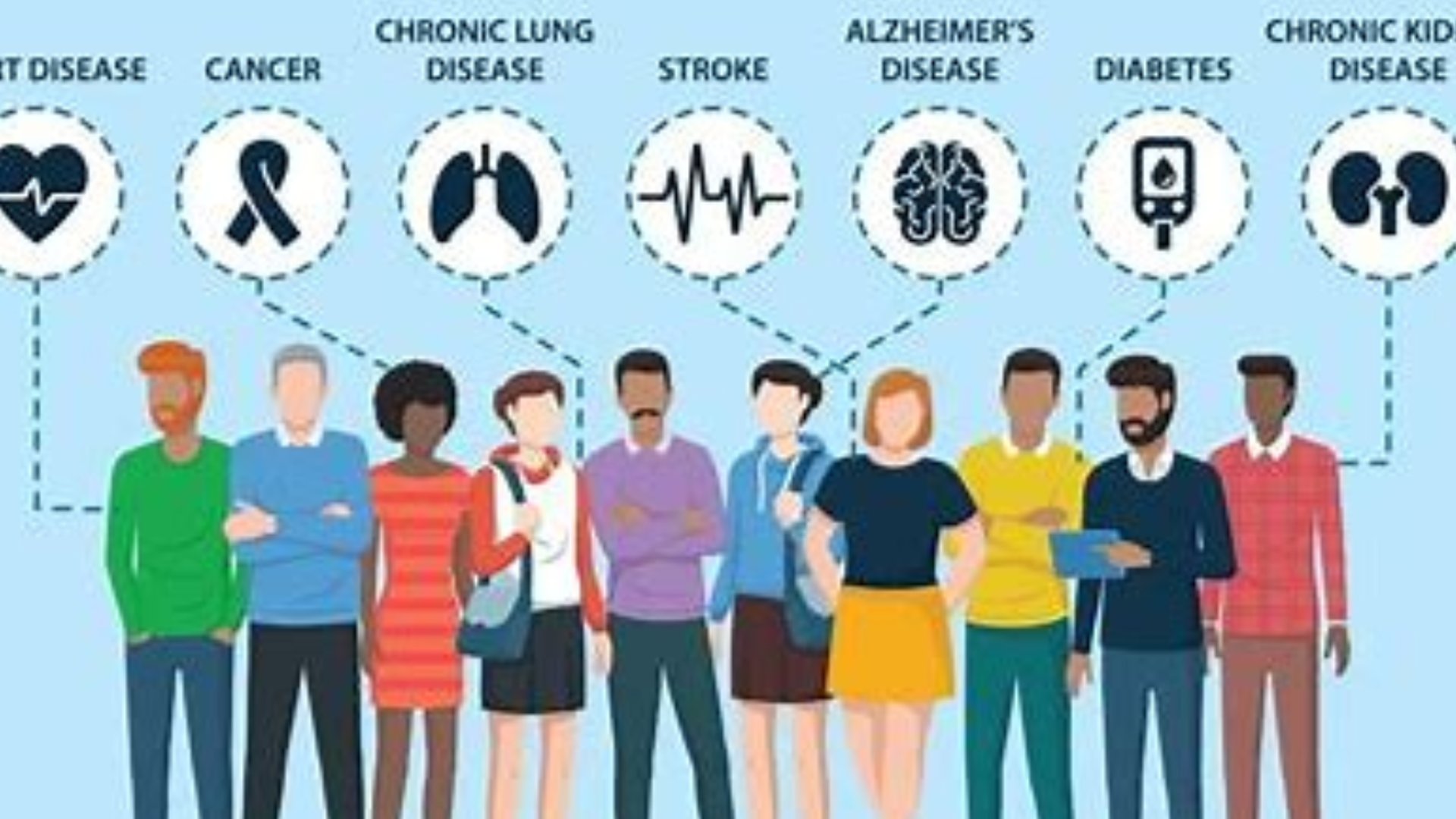
fasting benefits autophagy : mirakle & risk
Discover how fasting with medical supervision can effectively manage acute and chronic diseases. Explore the benefits of intermittent fasting, Islamic fasting, and autophagy as alternative treatments.
FASTING
Dr Hassan Al Warraqi



Intermittent Fasting, Islamic Fasting, & Autophagy
The Power of Fasting for Acute and Chronic Diseases
there is nothing equal to it.
Fasting is a shield
Fasting is the practice of abstaining from food or drink for a certain period of time.
It has been practiced for centuries for religious and spiritual purposes and its health benefits.
While fasting can take different forms, such as intermittent fasting, extended water fasting or Islamic fasting,
the basic principle remains the same – which is to give the body a break from constant digestion and allow it to focus on healing and repair.
It allows the fasting person to live a rare spiritual state.
fasting may be a useful alternative or complementary treatment for a variety of acute and chronic diseases.
Some potential health benefits of fasting include:
Improve blood sugar control
The problem of high blood sugar is one of the most common diseases in the world.
fasting can help improve blood sugar control.
During the fasting period, the body converts stored fat into energy to compensate for the lack of energy resulting from not eating.
This helps reduce blood sugar levels and improve the body's sensitivity to insulin,
a hormone that helps regulate blood sugar.
Promoting heart health
Fasting is also an effective way to promote heart health.
fasting can reduce levels of bad cholesterol (LDL) in the blood and increase levels of good cholesterol (HDL).
It can also help reduce inflammation and improve blood vessel function,
reducing the risk of cardiovascular diseases such as heart attacks and strokes.
And through complex working methods.
Promote brain health
fasting can contribute to improved brain health.
When the body stops eating, it activates protection and cleaning mechanisms in the brain.
Which helps remove dead and harmful cells and promote the growth of new cells.
This can improve mental functions and reduce the risk of diseases such as Alzheimer's, paralysis, dementia, and others.
Promote weight loss and increase physical activity
If you are looking to lose weight or become more physically active, fasting may be a good option.
During the fasting period, the body relies on stored fat as its main source of energy.
Fasting can contribute to burning fat and stimulating weight loss.
Fasting can also increase levels of human growth hormone, which promotes muscle growth and increases physical activity.
Improving immune system health
Fasting can boost immune system health.
During the fasting period, the body activates the cleaning and renewal mechanisms of immune cells.
This enhances the strength of the immune system and helps fight infections and diseases.
Improving digestive health
Fasting can also be beneficial for digestive health. During the fasting period, the digestive system gets a chance to rest and purify.
Fasting can help reduce inflammation and improve overall bowel and digestive function.
Reducing inflammation and oxidative stress
Inflammation and oxidative stress are factors that play a role in the development and progression of many chronic diseases, including cardiovascular disease, cancer, and neurodegenerative disorders.
Fasting can also help reduce inflammation, which may slow the progression of the disease and improve overall health.
Autophagy and stem cells
Autophagy is a normal cellular process that involves the degradation and recycling of damaged or dysfunctional cellular components.
It is a critical mechanism for maintaining cellular health and preventing the buildup of toxic substances.
Fasting has been found to stimulate autophagy, which may have a protective effect against various diseases, including cancer.
Fasting is known to boost stem cells. Increase stem cells during fasting.
Opening the way for the use of stem cells in a natural way without side effects.
Cancer and tumors
Early studies suggest that fasting may have potential benefits in preventing and treating cancer.
Fasting has been found to enhance the effectiveness of chemotherapy and radiotherapy, while also protecting healthy cells from damage.
Fasting may help reduce the risk of cancer recurrence and improve overall outcomes in cancer patients.
Types of fasting
There are several different types of fasting that people can choose according to their needs and abilities,
and there are other types that are not mentioned because they are not widespread.
1. Intermittent fasting
This type of fasting includes periods of intermittent fasting and periods of normal eating.
Intermittent periods of fasting can range from a few hours to several days.
Intermittent fasting is one of the most popular patterns of fasting used in many diets and weight loss programs.
2. Extended water fasting
In this type of fasting, one abstains from eating and drinking completely for a specific period of time, but only water is allowed.
Extended water fasting is more challenging and requires good preparation and careful medical follow-up.
3. Islamic fasting
Islamic fasting is a fast practiced during the holy month of Ramadan or during any time of the year,
during which Muslims are required to abstain from food and drink from dawn until sunset.
Islamic fasting is considered one of the fundamental acts of worship in Islam and is highly regarded in the Islamic community.
Fasting should be practiced in a healthy and responsible manner.
Fasting may be a useful alternative or complementary treatment for acute and chronic diseases,
but it is not a substitute for comprehensive and integrated medical care.
This means that if you have something or an acute illness such as influenza, typhoid, or a herniated disc, you must fast, as it is a treatment for you.
If you have something or a chronic disease such as diabetes, high blood pressure, blood fats, heart disease, or obesity, you should fast, as it is a treatment for you.
Fasting is a powerful tool that can be used as an alternative or complementary method for treating acute and chronic diseases.
For individuals looking to improve their health and wellbeing.
keywords
Fasting, acute diseases, chronic diseases. Intermittent fasting, Islamic fasting, autophagy, stem cells, medical supervision, alternative or complementary approaches,Fasting is a powerful tool that can be used as an alternative or complementary method for treating acute and chronic diseases.
Fasting and Autophagy
A Deep Dive into Their Close Relationship
This article explores the intricate connection between fasting and autophagy, a vital biological process that promotes cellular renewal and maintains overall health.
Optimized for SEO, this content highlights key insights and benefits, focusing on how fasting triggers autophagy and its potential health advantages.
What Is Autophagy?
Autophagy is a natural cellular process where the body cleanses itself by breaking down and recycling damaged or unnecessary components
It’s often described as:
"A natural mechanism where the body degrades and reuses or eliminates damaged or unneeded cells."
"An evolutionary self-preservation process."
"The body’s internal recycling system."
This process acts as routine maintenance, ensuring cellular balance and functionality.
How Does Fasting Trigger Autophagy?
Fasting stands out as one of the most powerful non-genetic triggers of autophagy. It activates this process through several biological mechanisms:
Decreased Glucose and Insulin Levels:
During fasting, blood sugar drops, prompting the body to burn fat for energy.
Lower insulin levels and increased glucagon—a hormone that initiates autophagy—follow suit.
Activation of Cellular Stress Pathways:
Reduced nutrient availability inhibits the mTOR protein (a key autophagy suppressor).
Simultaneously, AMPK protein activity rises, promoting autophagy.
Nutrient Deprivation Sensing:
The body responds to food scarcity by activating autophagy to supply essential materials for survival.
Benefits of Fasting-Induced Autophagy
Fasting-stimulated autophagy offers a wide range of potential health benefits, including:
Cellular Repair and Tissue Regeneration: Enhances cell health and supports tissue renewal.
Removal of Damaged Proteins: Clears out defective cellular components.
Reduced Inflammation: Mitigates chronic inflammation linked to various diseases.
Improved Brain Health: Boosts neuron regeneration, enhancing memory and focus.
Slowed Aging: Reduces free radical damage, a contributor to premature aging.
Enhanced Heart Health: Improves cardiovascular function.
Better Insulin Sensitivity: Aids in blood sugar regulation.
Weight Loss Support: Promotes efficient fat burning.
Digestive and Immune System Health: Strengthens these critical systems.
Cancer Prevention: May lower risks of certain cancers.
Stem Cell Production: Encourages the generation of new cells.
When Does Autophagy Begin During Fasting?
Autophagy doesn’t kick in immediately. It requires a specific timeframe:
"Typically, the body ramps up autophagy after 12-16 hours of fasting," when glucose and insulin levels drop sufficiently.
Types of Fasting That Support Autophagy
Different fasting methods stimulate autophagy to varying degrees, including:
Intermittent Fasting: Popular regimens like 16:8 or 5:2.
Prolonged Water Fasting: Multi-day fasts with only water.
Islamic Fasting: Daily fasting from dawn to dusk, as in Ramadan.
Alternate-Day Fasting: Fasting every other day.
Key Considerations and Warnings
Fasting Duration: Excessive fasting may not benefit everyone, especially those with specific health conditions.
Health Conditions: Consult a doctor before fasting, particularly if you have chronic illnesses, take medications, or are pregnant or breastfeeding.
Listen to Your Body: Stop fasting if you experience unusual symptoms.
Not a Medical Substitute: Fasting complements, but doesn’t replace, comprehensive healthcare.
Other Ways to Stimulate Autophagy
Beyond fasting, autophagy can be encouraged through:
Caloric Restriction: Consistent reduction in calorie intake.
Exercise: Regular physical activity.
Polyphenol Consumption: Found in green tea, turmeric, and red grapes.
Urolithin A Supplements: Emerging as a potential enhancer.
Autophagy Across Different Tissues
Evidence suggests fasting and calorie restriction trigger autophagy in various tissues—nerves, liver, heart, muscles, kidneys, pancreas, and white blood cells—improving organ health across the board.
Autophagy and Muscle Atrophy
Studies show fasting increases autophagy in fast-twitch muscles, leading to greater atrophy compared to slow-twitch muscles. This highlights differences in autophagy regulation across muscle types.
Conclusion
This SEO-optimized article underscores fasting as a potent trigger for autophagy, a process with numerous potential health benefits, from cellular repair to anti-aging effects.
However, fasting should be approached responsibly, with attention to individual health needs and professional guidance.
Ongoing research continues to unveil the mechanisms and impacts of fasting-induced autophagy, promising deeper insights in the future.
FAQs About Fasting and Autophagy: A Deep Dive
Below is a comprehensive, guide addressing frequently asked questions about fasting and autophagy.
This content is designed to provide in-depth insights into how fasting triggers autophagy, its benefits, and key considerations, while incorporating relevant keywords to boost search engine visibility.
1. What Is Autophagy, and How Is It Related to Fasting?
Autophagy is a natural cellular process where the body breaks down and recycles damaged or unnecessary components within cells. Derived from Greek, meaning "self-eating," it’s essential for maintaining cellular health and renewal.
Relation to Fasting: Fasting closely ties to autophagy because it creates a nutrient-scarce environment.
When you fast, nutrient levels drop, prompting cells to activate autophagy to eliminate damaged components and generate energy or essential materials for survival.
This process enhances cellular cleanup, making fasting a powerful trigger for autophagy.
SEO Keywords: Autophagy, fasting and autophagy, cellular health, self-eating process.
2. How Does Fasting Stimulate Autophagy at the Cellular Level?
Fasting induces autophagy through specific metabolic and hormonal changes:
Reduced Glucose and Amino Acids: During fasting, blood glucose and amino acid levels decline, lowering insulin and increasing glucagon levels.
mTOR Inhibition: The mTOR pathway (mammalian target of rapamycin), a primary autophagy suppressor, is inhibited due to nutrient scarcity.
AMPK Activation: Simultaneously, the AMPK pathway (AMP-activated protein kinase) is activated, promoting autophagy.
Cellular Cleanup: This shift encourages cells to initiate a "self-cleaning" process, breaking down dysfunctional components for recycling.
These mechanisms make fasting an effective way to stimulate autophagy at the cellular level.
SEO Keywords: Fasting triggers autophagy, mTOR inhibition, AMPK activation, cellular cleanup.
3. What Are the Potential Health Benefits of Stimulating Autophagy Through Fasting?
Fasting-induced autophagy offers numerous potential health benefits, including:
Cellular Repair and Regeneration: Removes damaged proteins and organelles, promoting healthier cells.
Anti-Aging Effects: Reduces the accumulation of old, dysfunctional cells that contribute to aging.
Neuroprotection: Clears protein aggregates linked to neurodegenerative diseases like Alzheimer’s and Parkinson’s.
Heart Health: Improves blood vessel function and reduces cardiovascular risk factors.
Improved Insulin Sensitivity: Enhances blood sugar regulation, aiding metabolic health.
Immune System Support: Rejuvenates immune cells, boosting infection resistance.
Reduced Inflammation: Lowers chronic inflammation, a root cause of many diseases.
Cancer Prevention: Eliminates damaged cells that could become cancerous and may enhance cancer treatment efficacy.
These benefits highlight why autophagy is a trending topic in health and wellness.
SEO Keywords: Autophagy benefits, fasting health benefits, anti-aging, neuroprotection, cancer prevention.
4. How Long Do You Need to Fast to Significantly Trigger Autophagy?
The time required to activate autophagy varies based on individual factors like metabolism and overall health. Research suggests:
12-16 Hours: Autophagy typically begins to increase after 12-16 hours of fasting.
Peak Activity: It may peak between 24-48 hours of continuous fasting.
Intermittent Fasting: Shorter fasting periods, like those in intermittent fasting, can also promote autophagy over time with consistency.
Individual responses differ, so starting with shorter fasts and gradually extending duration is advisable.
SEO Keywords: How long to fast for autophagy, intermittent fasting autophagy, fasting duration.
5. Are There Other Ways to Stimulate Autophagy Besides Fasting?
Yes, several methods can promote autophagy without fasting:
Caloric Restriction: Reducing calorie intake by 10-40% mimics fasting’s effects on cells.
Exercise: High-intensity workouts, in particular, stimulate autophagy in muscles and other tissues.
Ketogenic Diet: A high-fat, low-carb diet induces ketosis, replicating some metabolic effects of fasting.
Natural Compounds: Consuming fasting-mimicking compounds like polyphenols (e.g., EGCG in green tea, curcumin in turmeric, resveratrol in red grapes), berberine, or spermidine can enhance autophagy.
These alternatives complement fasting for a holistic approach to cellular health.
SEO Keywords: Stimulate autophagy without fasting, caloric restriction, ketogenic diet, polyphenols.
6. What Types of Fasting Support Autophagy?
Various fasting methods can promote autophagy to different extents:
Intermittent Fasting: Alternates eating and fasting periods, e.g., 16/8 method (16 hours fasting, 8 hours eating) or alternate-day fasting.
Prolonged Fasting: Involves fasting for 24+ hours, potentially more effective but requiring caution and medical supervision.
Water Fasting: Restricts intake to water only for a set period, a challenging yet potent autophagy trigger.
Islamic Fasting (Ramadan): Daily fasting from dawn to sunset, which can stimulate autophagy due to consistent daily fasting windows.
Each method suits different lifestyles and health goals.
SEO Keywords: Types of fasting for autophagy, intermittent fasting, prolonged fasting, Islamic fasting.
7. Are There Risks or Considerations When Using Fasting to Stimulate Autophagy?
Fasting can be beneficial but comes with risks and considerations:
Not Suitable for Everyone: Pregnant or breastfeeding women, children, individuals with eating disorders, or those with chronic conditions (e.g., type 1 diabetes, advanced heart disease) should avoid fasting without medical guidance.
Side Effects: Potential issues include dizziness, headaches, fatigue, or dehydration, especially during prolonged fasting.
Medication Interactions: Fasting may affect how medications work, so consult a doctor beforehand.
Balanced Nutrition: Ensure nutrient-rich meals during eating windows to avoid deficiencies.
Gradual Approach: Start with shorter fasting periods and increase duration as your body adapts.
Careful planning minimizes risks while maximizing benefits.
SEO Keywords: Fasting risks, autophagy considerations, safe fasting practices.
8. What Is the Potential Role of Autophagy in Disease Prevention and Treatment?
Emerging research suggests autophagy plays a critical role in health and may have therapeutic applications for various conditions:
Neurodegenerative Diseases: Clears protein aggregates linked to Alzheimer’s, Parkinson’s, and Huntington’s diseases.
Cancer: Removes damaged cells to prevent tumor formation and may improve chemotherapy and radiation effectiveness.
Metabolic Disorders: Enhances insulin sensitivity and regulates glucose/lipid levels, aiding obesity and type 2 diabetes management.
Infectious Diseases: Eliminates intracellular pathogens and boosts immune responses.
Inflammatory Conditions: Reduces chronic inflammation, a factor in many chronic diseases.
While promising, more human studies are needed to fully understand autophagy’s role and how to target it for disease prevention and treatment.
SEO Keywords: Autophagy disease prevention, autophagy cancer treatment, neurodegenerative diseases, metabolic health.
Conclusion
This SEO-optimized FAQ guide provides a deep dive into fasting and autophagy, addressing common questions with detailed, evidence-based answers.
Fasting is a powerful tool to stimulate autophagy, offering benefits like cellular repair, anti-aging, and disease prevention. However, it requires careful consideration of individual health needs and professional guidance to ensure safety.
As research evolves, autophagy’s role in health and wellness continues to gain attention, making it a key topic for those seeking to optimize their well-being.
SEO Keywords: Fasting and autophagy FAQs, autophagy benefits, how fasting works, cellular health guide.
